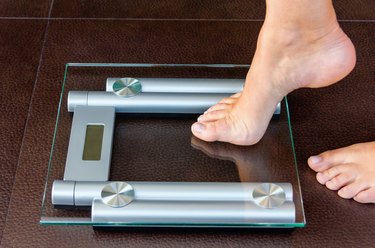
The start of any diet can be the part of your plan to slim down and get fit that is most prone to failure. As you attempt to establish new habits, your body often wants to cling to the old ways of doing business, and it's possible to gain weight in the first few weeks of your diet. If you choose a diet that is too aggressive for your body type, a diet that is incompatible with your exercise regimen, a diet that causes fluid retention or a diet that builds muscle rather than burn fat, you will gain weight.
More Than Calories
Video of the Day
Losing weight on a diet plan is a little more complex than simple calorie restriction. While the main focus will be reducing your caloric intake, any drastic reduction at the outset of your diet can cause your metabolism to slow down, prompting your body to hold on to excess weight because it senses an impending period of starvation. The U.S. Department of Agriculture advises a gradual calorie reduction in the beginning phases of a weight-loss diet plan. An incorrect dietary balance can also cause weight gain. The quality and mix of calorie types in your diet plan is crucial, regardless of how many calories the diet allows. For best results, consume a balanced diet where you get about 33 percent of your calories from quality protein sources like lean animal meat, fish, or whey; 33 percent should come from complex carbohydrate sources like fruits and vegetables; the remaining 33 percent should come from high-quality fats, like nuts, oils and seeds.
Video of the Day
Exercise Issues
If you're combining your diet plan with a high-intensity exercise program, you may be trying to do too much without the fuel necessary to succeed. Exercise demands calories. Yet if you're aggressively restricting your calories while ramping up the exercise, your metabolism is going to encounter the same problem that it does with a too-restrictive diet – it's going to stall and ultimately burn fewer calories. Carefully increase your calorie intake to match the increased level of exercise. Often, this can be as simple as consuming an additional 100-200 calories of protein, healthy fat or complex carbs a day.
Fluids and Hydration
When you make a drastic change like altering your diet, your body may not be used to the new foods you're eating. Certain nutrient imbalances may cause you to retain fluids, which adds water weight. Even though you're reducing your calories, your body is holding onto excess fluid. To counteract this, make sure your diet foods are low in sodium. Also, if you are exercising more in conjunction with your new diet and you're not increasing your water intake enough, you may be adding excess water weight through dehydration. When your body gets dehydrated, it holds onto fluids and bloating occurs. The best remedy for this type of fluid retention is to simply drink more water. When exercising and dieting, avoid sports and energy drinks as they are often high in calories and can quickly cause you to gain weight.
Pounds and Inches
One common misconception about diet and exercise is that all weight loss is good, and any weight gain or lack of loss is a failure. Some diet-and-exercise plans just aren't made to promote weight loss. High-protein diets that fuel a strength-training program, for example, are intended to develop lean muscle mass. Lean muscle mass is more dense than body fat, so a program that exchanges 1 pound of body fat for 1 pound of muscle is going to make you more lean and fit, but that won't show up on the weight scale. You'll still weight the same amount. If you're on a diet and exercise plan to build lean muscle mass, switch to a weight scale that also analyzes body-fat composition or have your body-fat percentage measured periodically using calipers to track your progress, rather than rely on tracking body weight.